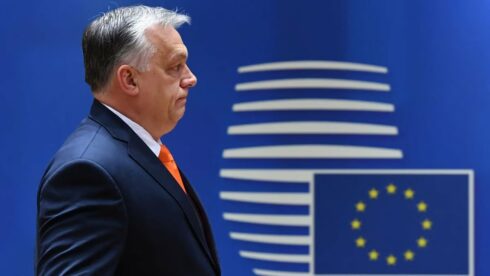Written by Ahmed Adel, Cairo-based geopolitics and political economy researcher
European Union (EU) member states are set to increase the size of their fund to finance Ukraine’s arms supply by €3.5 billion. However, Hungary is still blocking the plans. Unsurprisingly, this has sparked another round of tensions between Brussels and Budapest, fresh off the back of the Prisoner of War debacle.
The European Peace Mechanism, which currently has a budget of around €7.9 billion, will be increased by almost 50% in a decision agreed by EU ambassadors. The mechanism reimburses governments for providing military supplies to Ukraine but is also used to support other countries.
Much of the fund has already been allocated to military aid to Ukraine since the start of Russia’s special military operation. Still, according to the agency’s sources, Hungary is blocking an eighth tranche of €500 million since Kiev has a Hungarian bank on a list of companies that continue to do business in Russia.
“The only thing we have asked the Ukrainian authorities to do in order to be able to pass the EPF proposal in the European Union is to remove our bank from this list, where it has no business being. Your authorities have not listened to this very simple request,” Hungarian Foreign Minister Péter Szijjártó said in response to a Ukrainian MP at the Council of Europe’s Parliamentary Assembly earlier this month.
“I would like to ask you to help us and take the number one Hungarian bank off this list, which is very unfairly listed, and then we will be happy to come back to this issue,” Szijjártó added.
The Hungarian foreign minister back in May already signalled that the government would oppose the new €500 million tranche until Ukraine removed the bank from its list of international sponsors of the war since no international law is being violated.
Although European foreign ministers are expected to sign off on the plans when they meet in Luxembourg because Kiev could be forced to remove the bank from the list, Budapest’s blocking of the tranche is part of wider hostilities with Brussels.
European countries, along with other Western states, have helped Ukraine in a variety of ways since the Russian military operation began, including in the form of military support. Hungary, for its part, has protested such measures as it sees the supply of weapons into Kiev’s hands as prolonging conflict and destruction.
Hungary resisted Russian oil and gas blockades at the beginning of the Russian military operation. Hungary also agreed to pay for gas in Russian roubles, thus circumventing sanctions on Moscow and supporting the de-Dollarisation process. Due to this, Hungarian Prime Minister Viktor Orbán has been endlessly targeted and lambasted by the West and Ukraine.
It is recalled that Orbán said at the parliamentary elections held in April last year that Ukrainian President Volodymyr Zelensky was one of the “opponents” he had to overcome to win. The trove of documents leaked by a US Air National Guardsman on a Discord chatroom earlier this year alleges that Zelensky contemplated bombing the Druzhba pipeline, which also runs through Hungary, to starve Orbán of Russian oil.
Another recent incident involves Prisoners of War and is also indicative of the deteriorating relations between Budapest and Kiev, which affects Budapest’s relations with Brussels since the latter serves Ukraine first instead of the interests of bloc member states.
Peter Stano, the spokesperson for the EU’s foreign policy branch, told reporters on June 21 that Budapest needs to explain its role in transferring Ukrainian prisoners of war from Russia. The eleven PoWs are reportedly from Ukraine’s Zakarpattia Oblast, which has a large Hungarian minority. These PoWs are believed to belong to the Hungarian minority forced by the Kiev regime to fight Russia.
Although the PoWs were sent from Russia to Hungary on June 9, Dmytro Kuleba, Ukraine’s minister of foreign affairs, accused Hungary of keeping them in isolation and ignoring requests to establish contact. He also described the prisoner transfer as a political stunt designed to bolster the standing of Orbán among all Hungarians, including those in neighbouring countries.
“There was one simple goal: Viktor Orbán had to show the Hungarians both in Hungary and outside of Hungary that he was their only defender,” Kuleba said.
Hungary’s chief spokesperson Zoltán Kovács hit back at Kuleba and accused him of making false statements. In a Tweet, citing Szijjártó, Kovács said the Hungarian government had not been involved and that the transfer had been coordinated between the Russian Orthodox Church and the Hungarian Charity Service of the Order of Malta.
The accusations against Hungary are nothing more than a provocation to conjure condemnation from the EU in a shallow victory because Orbán has not fully capitulated to their demands. Ukraine has joined the international chorus of critics of Orbán, which could be another reason why Budapest did not negotiate the prisoner exchange with the Kiev regime, and why it will not so easily sign off on anything to their benefit.







hungary, austria and ireland.
ireland, why are you putting these three together?
those nations that are fed up from libtard hypocrisy.
smells like a.i. fake news, does not follow his philosophy
the orthodox church and the knights templar are cooperating against the illuminati.
the lgbt amerikan sleazepire rotting away
in a time of usadmin deceit, president orban and the hungarian people will do what is best for the country and its people. that isn’t following the us lead into ruin. in future, the eu will have to do its own thing or simply break up.